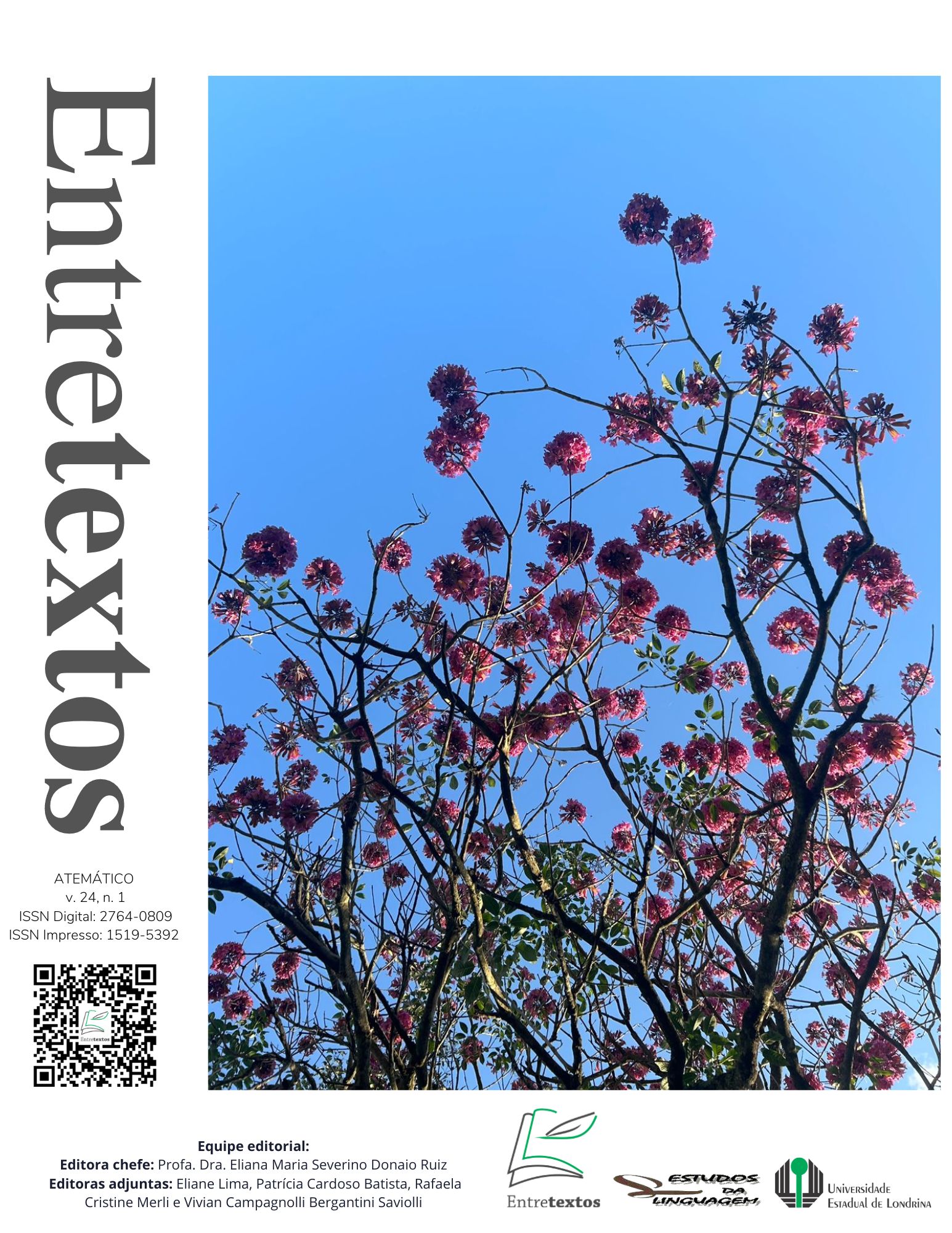Transmedia storytelling in the teaching and learning of portuguese language in the digital culture
DOI:
https://doi.org/10.5433/1519-5392.2024v24n1p380-400Keywords:
transmedia storytelling, portuguese language, digital cultureAbstract
Currently, we live in a society immersed in a digital culture, leading to changes in the teaching and learning. This research aims to investigate how transmedia storytelling contributes to the teaching and learning of Portuguese in digital culture. She is theoretically divided on Buckingham (2010) and Kenski (2018), regarding digital culture; Figueiredo (2016), Jenkins (2009) and Moura and Franco (2023), about transmedia storytelling; and Domingos (2013) and Falcão (2021), about teaching and learning of Portuguese. The methodology is based on a qualitative, documentary and applied research approach. The corpus consists of three (03) selected transmedia narratives: House of M (2005), WandaVision (2021) and Doctor Strange in the Multiverse of Madness (2022). The analysis of the corpus reveals that they present: interrelationships, expansion to different forms of media, diffusion across platforms and presence of a main narrative thread. The results show the following contribution to the teaching and learning of Portuguese: development of skills and competences, production of digital textual genres, creation of transmedia narratives, encouragement of critical thinking and mobilization of cognitive mechanisms. It is concluded that transmedia storytelling in classrooms is a demand in day-to-day education, facilitating the development of students' skills and abilities required by contemporary society.
Downloads
References
BRASIL. Ministério da Educação. Base Nacional Comum Curricular. Brasília, 2018.
BUCKINGHAM, D. Cultura digital, educação midiática e o lugar da escolarização. Educação e realidade, Porto Alegre, v. 35, n. 3, p. 37 - 58, 2010. Disponível em: http://educa.fcc.org.br/scielo.php?script=sci_abstract&pid=S0100-31432010000300004&lng=pt&nrm=iso. Acesso em: 8 nov. 2022.
BENDIS, B. M. DINASTIA M. Estados Unidos: Marvel Comics, n. 1, 2005.
DOMINGOS, A. C. M. Narrativa transmídia: travessia entre comunicação e letras. Aletria: Revista de Estudos de Literatura, [S.l], v. 23, n. 3, p. 159-171, 2013. Disponível em: https://periodicos.ufmg.br/index.php/aletria/article/view/18562. Acesso em: 27 dez. 2022. DOI: https://doi.org/10.17851/2317-2096.23.3.159-171
FALCÃO, B. A produção da narrativa transmídia no ensino de língua portuguesa para o nono ano. 2021. 250 f. Dissertação (Mestrado em Letras) - Universidade de São Paulo, São Paulo, 2021. Disponível em: https://www.teses.usp.br/teses/disponiveis/8/8162/tde-01102021-204203/publico/2021_BarbaraFalcao_VCorr.pdf. Acesso em: 30 abr. 2024.
FIGUEIREDO, C. A. P. Narrativa transmídia: modos de narrar e tipos de história. Letras, Santa Maria, v. 26, n. 53, p. 45-64, jul./dez. 2016. Disponível em: https://periodicos.ufsm.br/letras/article/view/25079. Acesso em: 30 abr. 2024. DOI: https://doi.org/10.5902/2176148525079
FRANCO, E. S. Histórias em quadrinhos e hipermídia: uma experiência de criação utilizando a hibridização de linguagens. In: INTERCOM - CONGRESSO BRASILEIRO DE CIÊNCIAS DA COMUNICAÇÃO, 27, 2004. Anais… Porto Alegre., 2004, p. 1-14. Disponível em: https://www.portcom.intercom.org.br/pdfs/69418422769686762130156552632318686703.pdf. Acesso em: 30 abr. 2024.
GALLO, P.; COELHO, M. G. P. Aquisição dos letramentos necessários à cultura da convergência: a narrativa transmídia na escola. Quipus, Rio Grande do Norte, n. 1, p. 51-62, 2011. Disponível em: https://repositorio.unp.br/index.php/quipus/article/view/59. Acesso em: 30 abr. 2024.
GIL, A. C. Como elaborar projetos de pesquisa. 4. ed. São Paulo: Atlas, 2002. 176 p.
JENKINS, H. Cultura da convergência. Tradução Susana Alexandria. 2. ed. São Paulo: Aleph, 2009.
KENSKI, V. Verbete cultura digital. In: MILL, D. (org.). Dicionário crítico de educação e tecnologias e educação a distância. Campinas: Editora Papirus, 2018. p. 1-8. Disponível em:https://www.academia.edu/43844286/Verbete_CULTURA_DIGITAL?auto=citations&from=cover_page. Acesso em: 08 nov. 2022.
LANKSHEAR, C.; KNOBEL, M. (ed.). A new literacies sampler. Nova Iorque: Peter Lang Publishing, 2007. 252 p. v. 29.
LÉVY, P. Cibercultura. Tradução Carlos Irineu da Costa. São Paulo: Editora 34, 1999. 264 p.
LIMA, D. J.; MERCADO, L. P. L.; VERSUTI, A. C. A transmídia e sua potência na prática de leitura e produção textual. RIAEE: Revista Ibero-Americana de Estudos em Educação, Araraquara, v. 12, n. 2, p. 1313-1330, 2017. Disponível em: https://periodicos.fclar.unesp.br/iberoamericana/article/view/10299. Acesso em: 1 nov. 2022. DOI: https://doi.org/10.21723/riaee.v12.n.esp.2.10299
MINAYO, M. C. S. O desafio da pesquisa social. In: DESLANDES, S. F.; GOMES, R.; MINAYO, M. C. S. (org.). Pesquisa social: teoria, método e criatividade. 28. ed. Petrópolis, RJ: Vozes, 2009. p. 9-30.
MOURA, K. M. P.; FRANCO, S. R. K. Narrativa transmídia na formação de professores: produções e potencialidades. Revista Contemporânea de Educação, [S.l], v. 18, n. 41, 2023, p. 327-345. Disponível em: https://revistas.ufrj.br/index.php/rce/article/view/54981. Acesso em: 30 abr. 2024.
PAIVA, V. L. M. O. Manual de pesquisa em estudos linguísticos. São Paulo: Parábola, 2019. (Educação linguística; 14)
RAIMI, S.; FEIGE, K. Doutor Estranho no Multiverso da Loucura. Estados Unidos: Walt Disney Studios Motion Pictures, 2022. Disponível em: https://www.disneyplus.com/pt-br/movies/doutor-estranho-no-multiverso-da-loucura/27EiqSW4jIyH. Acesso em: 27 jan. 2023.
SHAKMAN, M. Anteriormente em (Temporada 1, ep. 8). In: SHARKMAN, M. Wandavision. Minissérie. Produção: Jac Schaeffer. Estados Unidos: Marvel Studios, 2021. (47 min).
TORRE ARANDA, M. C.; FREIRE, M. M. Narrativas transmídia: entre multiletramentos e letramentos transmídia, o que levar para a aula de línguas? Trab. Ling. Aplic., Campinas, n. 59.2, maio/ago. 2020, p. 1531-1554. Disponível em: https://www.scielo.br/j/tla/a/NpJtTZS7WvTSNKN4NPXNJTd/abstract/?lang=pt. Acesso em: 30 abr. 2024. DOI: https://doi.org/10.1590/010318136618811520200306
VERGUEIRO, W. A linguagem dos quadrinhos: uma "alfabetização" necessária. In: RAMA, A.; et al. (org.). Como usar as histórias em quadrinhos na sala de aula. 2. ed. São Paulo: Editora Contexto, 2005. p. 31-65. [Cap. 2]
Downloads
Published
How to Cite
Issue
Section
License
Copyright (c) 2024 Anderson Alves da Silva Viveiros, Naziozênio Antonio Lacerda

This work is licensed under a Creative Commons Attribution 4.0 International License.
Entretextos adota a Licença Creative Commons Attribution 4.0 International, portanto, os direitos autorais relativos aos artigos publicados são do/s autor/es.
Sob essa licença é possível: Compartilhar - copiar e redistribuir o material em qualquer suporte ou formato. Adaptar - remixar, transformar, e criar a partir do material, atribuindo o devido crédito e prover um link para a licença e indicar se mudanças foram feitas.























